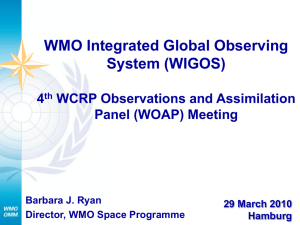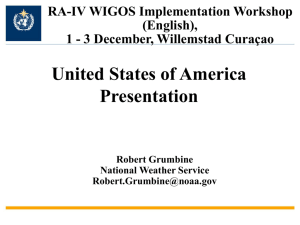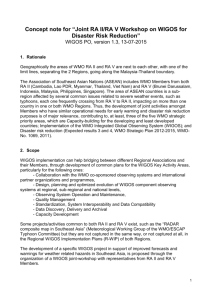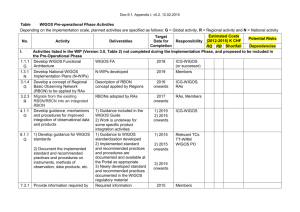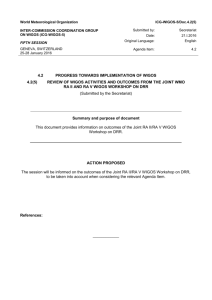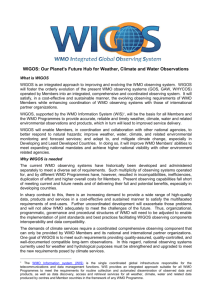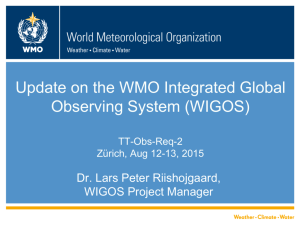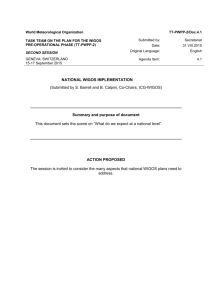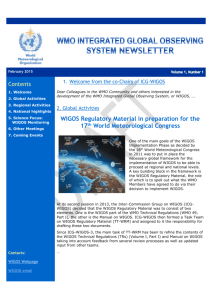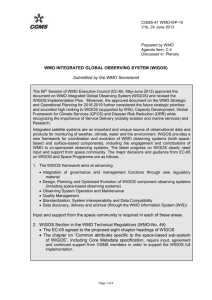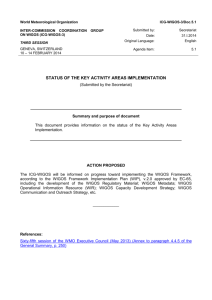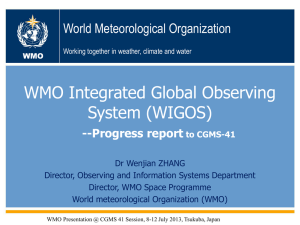CBS/MG-12/Doc.3.2.1_WIGOS
advertisement
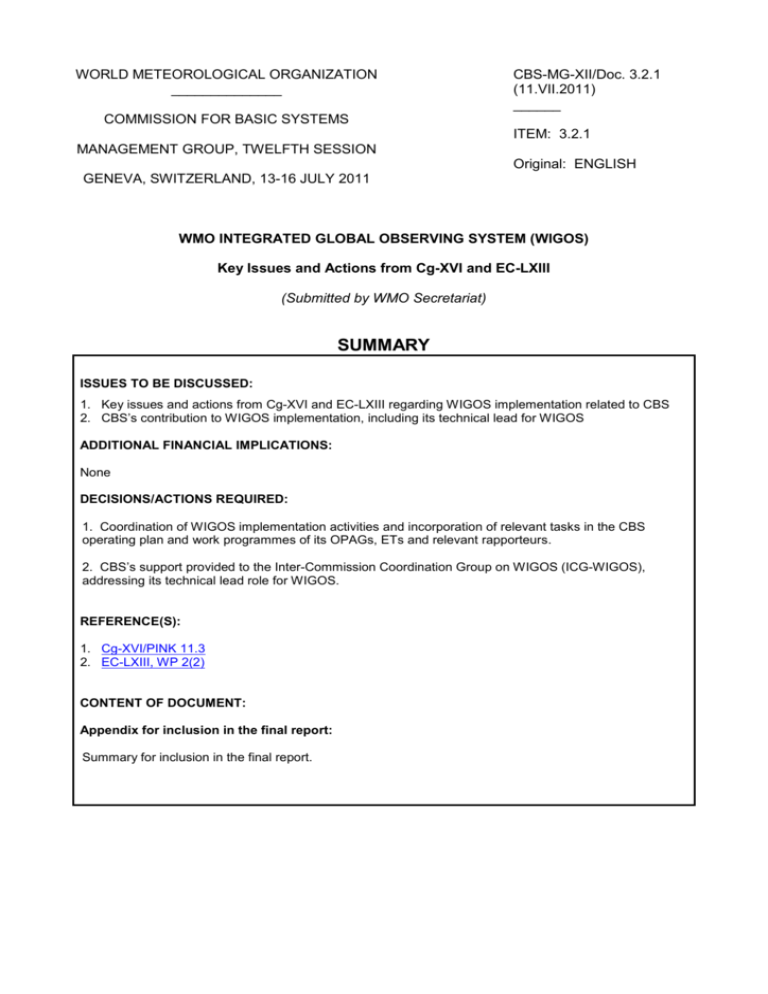
WORLD METEOROLOGICAL ORGANIZATION ______________ CBS-MG-XII/Doc. 3.2.1 (11.VII.2011) ______ COMMISSION FOR BASIC SYSTEMS ITEM: 3.2.1 MANAGEMENT GROUP, TWELFTH SESSION Original: ENGLISH GENEVA, SWITZERLAND, 13-16 JULY 2011 WMO INTEGRATED GLOBAL OBSERVING SYSTEM (WIGOS) Key Issues and Actions from Cg-XVI and EC-LXIII (Submitted by WMO Secretariat) SUMMARY ISSUES TO BE DISCUSSED: 1. Key issues and actions from Cg-XVI and EC-LXIII regarding WIGOS implementation related to CBS 2. CBS’s contribution to WIGOS implementation, including its technical lead for WIGOS ADDITIONAL FINANCIAL IMPLICATIONS: None DECISIONS/ACTIONS REQUIRED: 1. Coordination of WIGOS implementation activities and incorporation of relevant tasks in the CBS operating plan and work programmes of its OPAGs, ETs and relevant rapporteurs. 2. CBS’s support provided to the Inter-Commission Coordination Group on WIGOS (ICG-WIGOS), addressing its technical lead role for WIGOS. REFERENCE(S): 1. Cg-XVI/PINK 11.3 2. EC-LXIII, WP 2(2) CONTENT OF DOCUMENT: Appendix for inclusion in the final report: Summary for inclusion in the final report. CBS-MG-XII/Doc. 3.2.1 3.2.1 WIGOS Implementation 3.2.1.1.1 Congress recognized WIGOS as one of the strategic priorities of the Organization to improve Members’ capabilities to effectively provide in a timely fashion a wide range of high quality data, products and services; in this regard Cg-XVI adopted Resolution 11.3/1 (Cg-XVI) Implementation of the WMO Integrated Global Observing System (WIGOS). 3.2.1.1.2 Cg-XVI agreed that WIGOS will lead to cost-effectiveness and enhancing observing capabilities of Members, and it will enable WMO Members to better respond to natural hazards, improve environmental monitoring, and adapt to climate change and man-made environmental impacts, especially in developing and Least Developed Countries. 3.2.1.1.3 Congress further agreed that WIGOS must utilize international standards and best practices set by WMO and partner organizations. Therefore, a common standardization process is needed, facilitating interoperability 1 of WIGOS observing components, and implementation of quality management procedures. It will enable those user requirements for various application areas to be met at national, regional and global levels. 3.2.1.1.4 WIGOS will be essential for the Global Framework of Climate Services (GFCS), aviation meteorological services, disaster risk reduction, and capacity-building as WMO priorities. It will also ensure a coordinated WMO contribution to the co-sponsored GCOS, GOOS, GTOS, and to the Global Earth Observation System of Systems (GEOSS). Therefore, requirements of GFCS and other WMO priorities must be reflected in the updated CONOPS requested by Cg-XVI, and in the relevant implementation plans for global, regional/sub-regional and national levels to be developed by the WMO Secretariat, RAs and NMHSs, respectively. 3.2.1.1.5 Cg-XVI agreed that implementation of WIGOS must be reflected in the revised WMO Technical Regulations, documenting the WIGOS concept of operations and contributions of all observing components; the Manual on WIGOS will have to be developed. 3.2.1.1.6 EC-LXIII, adopting Resolution 2/2 (EC-LXIII), established the Inter-Commission Coordination Group on WIGOS (ICG-WIGOS) with representatives of regional associations and international partner organizations during the implementation process, and designated the president of the Commission for Basic System (CBS) as chairperson of ICG-WIGOS. 3.2.1.1.7 follows: In accordance with Resolution 11.3/1 (Cg-XVI), CBS strategic activities are as (a) Provide the technical lead for WIGOS; (b) Guide the technical aspects of WIGOS implementation; (c) Incorporate WIGOS implementation activities in their operating plan and work programme; (d) Provide technical guidance and advice to Members and the regional associations on WIGOS; (e) Develop guidance for the design and evolution of observing components of WIGOS; (f) Develop standards to support WIGOS in collaboration with partner organizations and programmes; (g) Update WMO Regulatory Material, including development of the Manual & Guide on WIGOS; coordination must be ensured (e.g. with revised Manual on Global DataProcessing and Forecasting System (GDPFS) (WMO-No. 485)) 3.2.1.2 In more details, it means development of: 1 Strategy to satisfy observing requirements through the RRR process and SoG (see also CBS-MG-XII/Doc. 3.2.2 – user requirements & the RRR database); Interoperability is key to turning observations into effective data that meets real user needs. CBS-MG-XII/Doc. 3.2.1, p. 2 WIGOS metadata standards, including its generation and management; (coordination with WIS is needed (see also CBS-MG-XII/Doc. 3.3.1); Implementation Plan for the Evolution of WIGOS beyond 2015 (E-WIGOS-IP-2015)2 including technical guidance on how to design, develop and implement integrated national observing systems to provide comprehensive observations in response to the needs of all WMO Members and Programmes for improved data products and services, for weather, water and climate; In this regard, priorities and needs of individual RA must be taken into account (see also CBS-MG-XII/Doc. 3.2.2 – EGOS-IP); Guideline for Members on WIGOS implementation at a national level (to specify all actions required at a national level for implementing WIGOS) (see also CBS-Ext.(2010) (WMO-No. 1070); Guideline / Handbook on QMS for WIGOS observing components including guidance on effective management, monitoring and evaluation of such a component; WIGOS operational and standardization databases, a WIGOS Portal, including an online search tool for WMO technical regulations; Study on benefits, efficiencies, cost effectiveness of WIGOS (ICG-WIGOS task) _________ 2 E-WIGOS-IP-2015 can be considered as a new stage of EGOS-IP. (Note: The WIGOS Implementation Plan (WIP) deals with establishing the effective and sustained organizational, programmatic, governance and procedural structures needed (to be submitted to EC-LXIV for approval), in a contrast to EGOS-IP/ E-WIGOS-IP-2015 dealing with the further evolution of WIGOS observing components.
